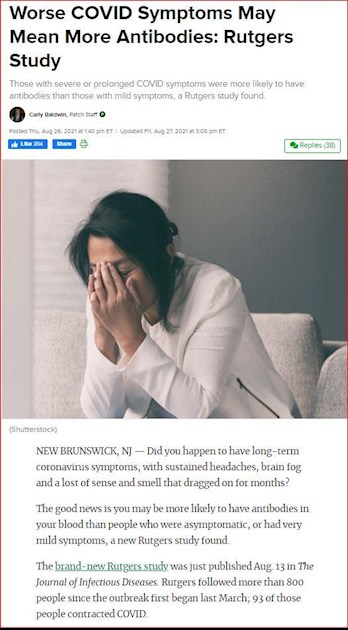Worse COVID Symptoms May Mean More Antibodies: Rutgers Study
Those with severe or prolonged COVID symptoms were more likely to have antibodies than those with mild symptoms, a Rutgers study found.
Carly Baldwin, Patch Staff Verified Patch Staff Badge
Posted Thu, Aug 26, 2021 at 1:40 pm ET Updated Fri, Aug 27, 2021 at 3:05 pm ET
-
patch.com/new-jersey/westfi...
NEW BRUNSWICK, NJ — Did you happen to have long-term coronavirus symptoms, with sustained headaches, brain fog and a lost of sense and smell that dragged on for months?
-
The good news is you may be more likely to have antibodies in your blood than people who were asymptomatic, or had very mild symptoms, a new Rutgers study found.
-
The brand-new Rutgers study was just published Aug. 13 in The Journal of Infectious Diseases. Rutgers followed more than 800 people since the outbreak first began last March; 93 of those people contracted COVID.
rutgers.edu/news/immune-res...
-
And they found that those with severe or long-lasting cases of COVID-19 were more likely to later have high levels antibodies. Antibodies are needed to fight against future infection of coronavirus.
-
The study:
As part of the Rutgers Corona cohort study, researchers followed 548 healthcare workers and 283 non-health care workers from the start of the pandemic to better understand risk factors, antibody responses and symptoms of SARS-CoV-2 infection.
-
Not all 831 people in the study got COVID; only 93 did: Of those 93, 24 were severely symptomatic and 14 were asymptomatic.
-
One-third of the infected participants had symptoms — such as fatigue, shortness of breath and loss of taste and smell — that lasted at least a month; 10 percent had symptoms that lasted at least four months.
-
The study found that while nearly all of them later developed antibodies against the virus, those who were sicker were much more likely to have higher levels: 96 percent who had severe symptoms were found to have immunoglobulin antibodies (antibodies in their blood).
-
For those who had mild to moderate symptoms, 89 percent showed blood antibodies. For those with no symptoms, 79 percent showed antibodies.
-
A minority of infected people not produce any detectable antibodies at all. Also, people who were asymptomatic had lower antibody levels.
Scientists think immunoglobulin antibodies are prized, as these are the antibodies that help fight off a second COVID infection.
"It is normal for antibody levels to decline over time. Nevertheless, IgG antibodies provide long-term protection to help the body fight reinfection," says co-lead author Emily Barrett, an associate professor of biostatistics and epidemiology at Rutgers.
-
Their study also found that healthcare workers were much more likely to become infected and develop severe symptoms, with nurses showing particularly high infection rates.
-
"Neurological changes, including brain fog and problems with memory or vision, were infrequent among infected participants but did tend to last for many months when they occurred," said co-lead author Dr. Daniel Horton, an assistant professor of pediatrics and epidemiology at Rutgers Robert Wood Johnson Medical School. "Notably, having persistent symptoms was also associated with having higher antibody levels over time."
-
He also encouraged people to get vaccinated against coronavirus, saying vaccines can help lessen "long-haul" COVID.
"We know from other research that vaccination further enhances immune protection and sometimes even helps ease long-term symptoms," said Dr. Horton.
-
While other studies looked at sick or hospitalized populations with symptomatic illness, the Rutgers study recruited people before they were diagnosed with SARS-CoV-2 infection and evaluated people across a spectrum of illness severity, including those who were asymptomatic, providing broader insight into antibody response over the long term.
-
Len
